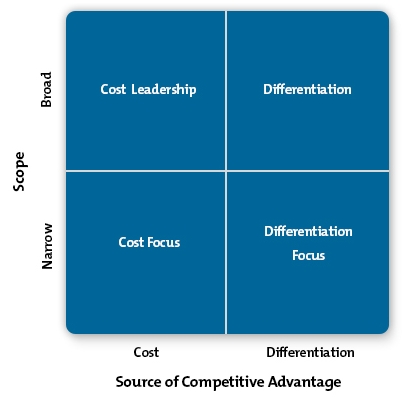Business Strategy
Porter's Five Forces

Bargaining Power of Buyers: High
Despite the relatively small size of the consumer electronics industry, those primarily electronic commerce companies, like Amazon, offer consumers a wide variety of purchasing options. The ability to research their options ultimately provides consumers/buyers with an advantage. To curtail their bargaining power, Best Buy promotes extended warranties. These warranties not only boost buyer-seller relationships, but also make it costly to seek alternative services.
Threat of Substitutions: Moderate to High
Cognizant of the threats posed by high-volume retailers, like Wal-Mart and Target, together with online retailers, such as Amazon, Best Buy has established a number of partnerships with electronics manufacturers in China. The products produced by these manufacturers are for Best Buy, but are marketed under generic brand names. These generic brand names allow Best Buy to maintain their customer base and market share, while subsequently reducing the threat of substitutions.
Bargaining Power of Suppliers: Moderate to High
Central to Best Buy's success within their respected industry is the well-grounded command of its supply chain and strong relationships with suppliers. While suppliers might have a relatively high bargaining power, they rely heavily on retailers, such as Best Buy, to sell their products and bring in revenue. Because Best Buy is so effective in generating sales and revenue, they are able to diminish the bargaining power of suppliers.
Threat of New Entrants: Low
Because Best Buy is part of an oligopoly, or a market dominated only by a select few sellers, the threat of new entrants is relatively low. That said, Best Buy does not necessarily have and/or need a defense mechanism.
Rivalry: High
Because the electronics retail industry is so fierce, Best Buy’s strategy revolves around competitive pricing and other non-tangibles. In terms of competitive pricing, Best Buy employs a price-matching strategy. While it may seem counterproductive, this strategy actually makes the company increasingly more price consequence in the consumer’s eyes. With regards to the above mentioned non-tangibles, Best Buy’s Geek Squad provides personal customer service in the following areas: appliances, cell phones, computers & tablets, etc. This service is only available to those who purchase directly from Best Buy.
Competitive Strategy


Comments
Post a Comment